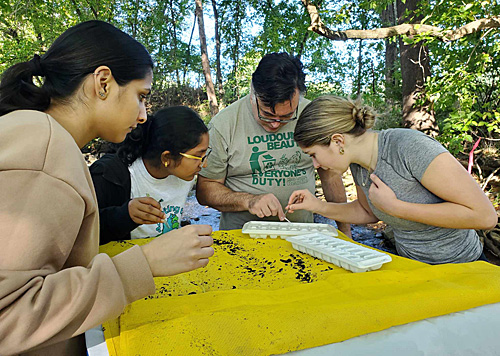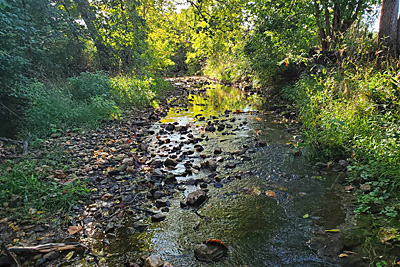
Academies of Loudoun students assisting Chris Henke with Tuscarora Creek survey.
Photo by Amy Ulland
Loudoun Wildlife’s Stream Team now has two benthic macroinvertebrate sites on the Westpark property in Leesburg: one on Tuscarora Creek and one on Dry Mill Branch. These are also chemical monitoring sites for our Chem Crew.
Formerly a golf course, the Westpark property is now owned by Loudoun County and is in the process of becoming a passive park. A pond separates the beginning of Tuscarora Creek and the end of Dry Mill Branch.
Four students from the Academies of Loudoun’s Envirothon team assisted our Stream Team with a recent survey of the Tuscarora Creek site and learned how to conduct both chemical and benthic macroinvertebrate surveys. The students learned how to collect, identify and tally macroinvertebrates living on the stream bottom and how to collect data for a variety of other parameters including pH, conductivity and water clarity.

Newly established Dry Mill Branch site.
Photo by Amy Ulland
The Tuscarora site received a score of 8 out of 12, indicating indeterminate ecological conditions resulting from a large number of both pollution-tolerant and pollution-sensitive organisms in the sample. Pollution-sensitive beetles and caddisflies comprised over half the sample, while pollution-tolerant aquatic worms and flat worms comprised over a quarter of the sample.
The Dry Mill Branch site, located about a quarter mile upstream from the Tuscarora site, was just established as a benthic macroinvertebrate site this fall. The stream received a score of 5 out of 12, indicating unacceptable ecological conditions. The majority of organisms collected here were netspinning caddisflies, but a good number of pollution-tolerant lung snails were also present.
The Westpark property is in a conservation easement and the county notes that “improvements on the property, including wetland and stream restoration projects and enhanced stormwater management infrastructure, are expected to result in significant nutrient and sediment reductions that will benefit local water quality.”

